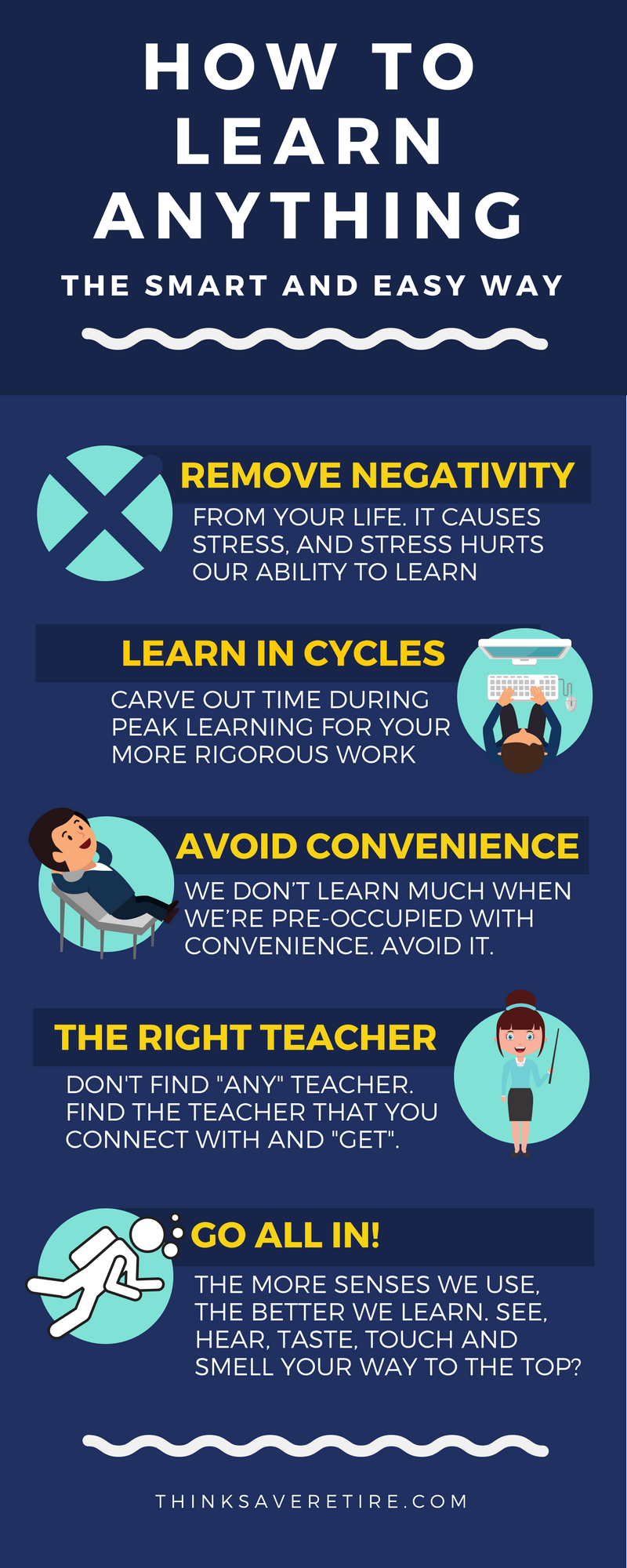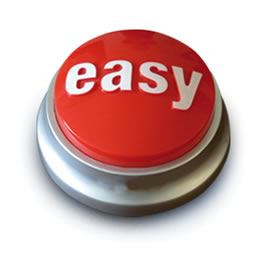How to learn anything - fast and easy
How do we humans learn anything? Focus. Our focus is so important that it literally makes or breaks our existence in the world and in the information we take in and absorb.

Over the years, I have become more and more convinced that life is nothing but a mind game, and those of us who understand that game and play within its simple boundaries often do the best in life. Its players are more likely to achieve their goals than those who sit on the sidelines and refuse to play.
Our minds interpret the world that surrounds us. The colors that we see, the language we hear and people we interact with all get filtered through our brains. Our brains add a layer of context, and magically, our natural environment, coupled with that context, becomes our understanding of the world in which we live.
Learning and focus are no different.
Deep Work (<-- affiliate link) author Cal Newport wrote succinctly about this phenomenon:
“Who you are, what you think, feel, and do, what you love—is the sum of what you focus on.”
Our focus is just so fucking important that it literally makes or breaks our existence in the world and in the information we take in and absorb. The better our focus, the better we do as people. And, the more we learn.
Learning is the result of focus.
And, it works for darn near everything. From learning 2nd-grade math to advanced placement physics, or learning the best route to get from your home to the grocery store, our ability to take in information and learn from that data revolves around a few remarkably simple concepts.
How to learn anything
For most of us, learning isn't difficult once we understand how we learn. The details will be different for all of us, but the overarching concepts of learning are pretty darn common.
Here's an infographic:

Remove negativity from your life
Protect your enthusiasm from the negativity of others. - H. Jackson Brown, Jr.
Our brains do not learn very well under stress. That's not just me telling you. That's science. "Previous research has already shown that stress can prevent the retrieval of memories. But now we have discovered that it also has a major effect on our perception and perceptual learning."
Stress produces a hormone called Cortisol, and Cortisol has been shown to block so-called "synaptic connections". Basically, our ability to learn and retain data. And, the ability to mentally translate that data into meaningful information.
This is also why our decision-making abilities are compromised when we're under stress. We lose precious IQ points. We become rash and emotional, mere shells of our former non-stressed selves as we turn into bumbling nitwits incapable of sound judgment and focus.
Unfortunately, money is one of the leading causes of stress in people's lives, and that's not an easy nut to crack. So are relationships. I can't offer advice on that front. Relationship advice? Come on, I'm not even near "qualified".
But!
One of the biggest causes of stress in my life used to be my addiction to the 24-hour news cycle. I was addicted to the news and had one of the top three 24-hour news stations blaring in the background any time I wasn't watching a live sporting event.
I was one of those "informed" people, but I also derived absolutely no satisfaction from all that biased or slanted information. It provided no value to my life. It was a source of frustration. As a result, I couldn't focus. I couldn't read and learn. It just wasn't working for me, and I trapped myself in that habit for years.
Today, I let the most important bits of worldly events slowly find their way into my little head organically through my dealings with the natural world. If it's important enough, I'll hear about it. If it's not, I won't. I quickly learned that most of what passes as news...just isn't. I couldn't be happier.
Devote time to learn during "learning cycles"
In high school, did you ever notice that you earned better grades in your morning (or afternoon) classes? Believe it or not, you're naturally more akin to learning during different parts of the day. You won't learn the same way each hour of the day. Our mental capacities ebb and flow all the time!
When we wake up, most of us are groggy and unfocused. We'd probably bomb a simple test that we might score quite well on later in the day. How much later?
Basically, around "midday" for most of us. I'm a morning person, so my peak "learning cycle" is earlier in the day. Yours might be later. This means that I read, learn and retain information easier and more efficiently in the mid-morning (ish) hours of the day. For me, off-peak hours (typically the late afternoon and evening) aren't optimal for learning. I probably lose IQ points during this time (but, studies show that off-peak hours are ripe for creative tasks - like writing this here article!).
Sleep also makes a big impact in our learning cycles. The more rested we are, the better we learn. Even those of us who don't outwardly feel as if we need sleep may be hurting our learning cycles without proper rest.
Whenever possible, arrange your schedule and carve out time during your peak learning cycle to accomplish the bulk of your more rigorous work. Except for obvious emergencies, don't let other tasks take your time away from learning during these hours.
Have you ever said, "I do my best work during such and such hours"? If so, that's probably right smack dab in the middle of one of your learning cycles.
Focus is key. No shits given to other tasks until your learning cycle ends.
Avoid the tyranny of convenience

The "easy" button. It's one of the most convenient mythical inventions known to man, but it's also an example of how convenience meticulously destroys our ability to learn.
What's the problem with convenience? In principle, nothing. There is nothing wrong with making things easier, quicker or more efficient. In fact, that's good!
In practice, though, convenience has grown a mind of its own. We make decisions based on convenience rather than what we'd normally decide. The quickest and/or easiest route is almost always the option we choose to take. It's natural. I do it, too.
But, we don't learn much when we're pre-occupied with convenience.
For example, instead of using the lost art of map reading, we punch an address into our mobile phones and listen to the electronic lady direct us to our destination. Instead of summoning the power of insanely simple math, we use a calculator to crunch the tip amount on our meal. We text instead of call. We drive instead of walk. We "idk" instead of "I Don't Know". Anybody remember those "World Book" encyclopedias? How many have used one of those lately?
Amazon's One-Click buying system is ingenious and convenient. It also costs us money. Lots of money. Amazon knows this.
Convenience erases struggle, and struggle is how we learn. Challenges make us stronger, wiser and more capable people. More capable humans.
Certainly, my point isn't that all convenience is somehow "bad" or evil. Hell, I like (and use) convenience as much as the next person. But, convenience also limits our ability to learn from life's tests, threats, and annoyances. Convenience is the "easy" button, and most of us learn much less when everything is easy.
Don't just find a teacher; find the right teacher
In grade school, I just couldn't pick up more advanced math concepts. Even in basic algebra, I struggled. Geometry was a bit easier because I am a visual person, but trigonometry re-introduced the fact that math and I just don't get along.
That is, until I realized it wasn't just the math that was the problem. It was the teacher.
Nearly all my math teachers taught in a very similar and standard way. Overhead projector and writing out a bunch of formulas. Over and over, I'd sit in class and try my damnest to learn as much as I could. Then, I'd ask my dad to re-teach some of the more difficult concepts to me, and instantly, everything made sense.
It was literally like magic.
My dad has a teaching style that resonates with me. It's clear. Concepts become much more obvious when I learn from him. I can't put my finger on exactly what it is, but I learn much more easily from him than I did any of my math teachers.
Did all my math teachers suck? Certainly not. In fact, one of my favorite teachers of all time was my algebra teacher in 9th-grade, Mrs. Odlen. She had a wickedly no-nonsense style about her, and she was clearly gifted. But still, her teaching style didn't resonate with me.
That didn't make her a "bad teacher", though. For me, my dad was just the right teacher.
Overwhelm yourself
In school, most of us figured out the point where we maximize our chances of scoring well on tests with minimal effort (I was especially guilty of - and good at! - this). We memorize a few facts and read just enough to score well on the test, then forget the majority of it and move on.
Why? Because in school, the goal of most kids isn't to learn. It's to score well enough on tests in order to move onto the next grade. And the next. Most of us didn't completely immerse ourselves in school subjects.
Most of what we learn comes outside of school. In the workplace. Interacting with people. Traveling. Most of us learn the best not when our heads are buried in a textbook, but when we're experiencing the topic. More than one of our senses is firing on all cylinders. We aren't just reading and memorizing facts.
We're interacting. Our sense of sight, touch, smell, hearing, and taste are all sources that help us learn, and the more of those senses that we can employ, the more we'll learn. We generally need more than just one or two to learn the best.
For example: We can read a book about public speaking, or we can actually speak publicly. We can listen to a teacher describe the plight of 3rd-world nations, or we can travel and see it for ourselves. You get the idea.
The more that we overwhelm ourselves, the more we'll learn because it envelopes our senses. It forces us to interact in ways that may not feel comfortable.
The struggle is real.